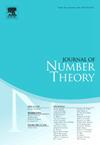On the hook length biases of the 2- and 3-regular partitions
IF 0.7
3区 数学
Q3 MATHEMATICS
引用次数: 0
Abstract
Let denote the total number of i hooks in the t-regular partitions of n. Singh and Barman (2024) [14] raised two conjectures on . The first conjecture is on the positivity of for . The second conjecture states that when , for all n except for . In this paper, we confirm the first conjecture. Moreover, we show that for any odd , the second conjecture fails for infinitely many n. Furthermore, we verify that the second conjecture holds for and 6. We also propose a conjecture on the even case k, which is a modification of Singh and Barman's second conjecture.
关于2规则分区和3规则分区的钩子长度偏差
设bt,i(n)表示n的t正则分区中i个钩子的总数。Singh和Barman(2024)[14]对bt,i(n)提出了两个猜想。第一个猜想是关于当n≥28时,b3,2(n)−b3,1(n)的正性。第二个猜想表明,当k≥3时,b2,k(n)≥b2时,除n=k+1外,所有n均为k+1(n)。在本文中,我们证实了第一个猜想。此外,我们证明了对于任意奇数k≥3,对于无穷多个n,第二个猜想不成立。进一步,我们证明了对于k=4和6,第二个猜想成立。我们还提出了一个关于偶数情况k的猜想,它是对Singh和Barman第二猜想的修正。
本文章由计算机程序翻译,如有差异,请以英文原文为准。
求助全文
约1分钟内获得全文
求助全文
来源期刊

Journal of Number Theory
数学-数学
CiteScore
1.30
自引率
14.30%
发文量
122
审稿时长
16 weeks
期刊介绍:
The Journal of Number Theory (JNT) features selected research articles that represent the broad spectrum of interest in contemporary number theory and allied areas. A valuable resource for mathematicians, the journal provides an international forum for the publication of original research in this field.
The Journal of Number Theory is encouraging submissions of quality, long articles where most or all of the technical details are included. The journal now considers and welcomes also papers in Computational Number Theory.
Starting in May 2019, JNT will have a new format with 3 sections:
JNT Prime targets (possibly very long with complete proofs) high impact papers. Articles published in this section will be granted 1 year promotional open access.
JNT General Section is for shorter papers. We particularly encourage submission from junior researchers. Every attempt will be made to expedite the review process for such submissions.
Computational JNT . This section aims to provide a forum to disseminate contributions which make significant use of computer calculations to derive novel number theoretic results. There will be an online repository where supplementary codes and data can be stored.
 求助内容:
求助内容: 应助结果提醒方式:
应助结果提醒方式:


